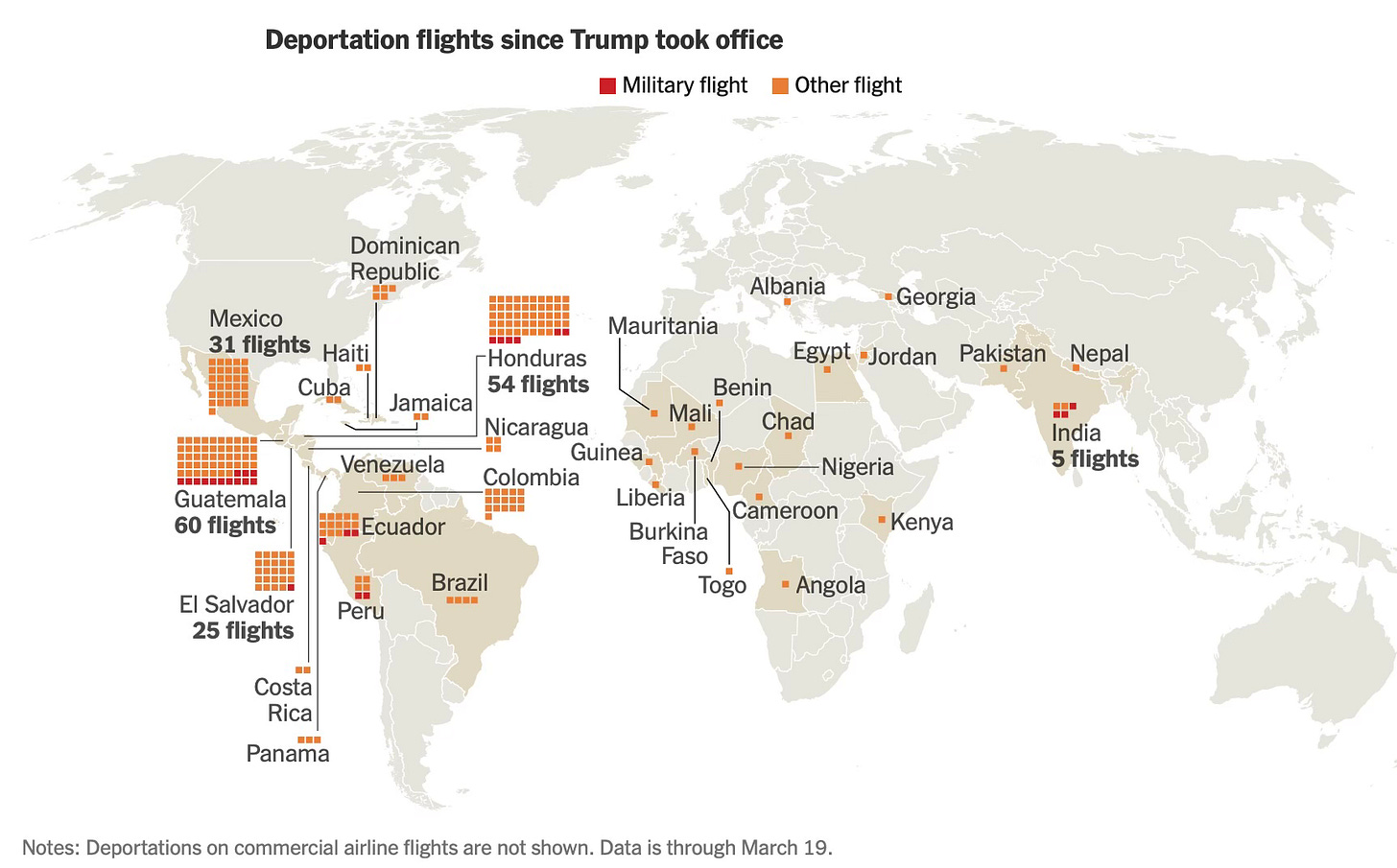[POST] Which national future are we actually buying with mass deportations?
It's always been do-able, but what are the near-term benefits-v-long-term costs?
This is a reader-supported publication. I give it all away for free but could really use your support if you want me to keep doing this.
Immigration and Customs Enforcement (ICE) just had its annual budget tripled by the Big Beautiful Bill, making it America’s single largest federal law enforcement agency, with the capacity to hire more agents than the FBI and detain more people than the entire Federal Bureau of Prisons. ICE’s budget now surpasses the combined budgets of the FBI, Drug Enforcement Administration (DEA), Bureau of Alcohol, Tobacco, Firearms and Explosives (ATF), Bureau of Prisons, and the US Marshals Service.
That’s the future of federal policing in Trump’s world, leaning into talk of de-naturalizing naturalized American citizens and even deporting native-born citizens if … you know, they cross Trump.
Back to the question posed by Alex Garland’s film Civil War:
Or try this one on for size: ICE now has a bigger budget than the Israeli Defense Force. Same goes for Italy, the Netherlands, and Brazil.
I’ve said it before and I’ll say it again: Trump is a domestic Neo-con. He can’t get enough warfare at or within our borders because that’s where all his enemies are to be found — not in the dictatorships abroad that he envies. This is why he’s made ICE the largest and most powerful federal law enforcement agency in US history, with resources and capacity far beyond any previous federal police force.
By doing so, Trump creates a force and a system that can be wielded against any American he deems unworthy of citizenship — regardless of how obtained.
Trump is a supreme militarist when it comes to our nation, because an autocrat needs emergencies to extend and maintain his internal rule.
So, besides giving Trump a quasi-military force able to snatch bodies off the street while wearing no uniforms, presenting no ID, and offering no warrants, what exactly does America gain from this nation-wide show of force?
Okay then, here’s the benefits case for mass deportations:
We are told that deporting millions of undocumented immigrants reduces the costs associated with providing public services, such as education, healthcare, and welfare, to people without legal status. Removing undocumented immigrants, particularly those with criminal records, will reduce crime rates and drug trafficking (see, fentanyl smuggling, gang activity). But, most of all when it comes to the MAGA base, this is all about being seen as fulfilling campaign promises and responding to public demand for stricter immigration enforcement. And, in truth, that’s not a bad argument after the lax manner in which the Biden Administration approached the issue. Hard to argue against restoring the rule of law and bolstering national sovereignty in this populist era.
Not a bad list, but lacking wider context.
On to the most likely negatives of mass deportation …
Deporting millions of undocumented immigrants will shrink the US gross domestic product (GDP) by 2.6% to 6.8%, a contraction comparable to, or worse than, the Great Recession.
We’re already seeing labor shortages in key industries. Why? Undocumented laborers form a significant portion of existing workforces:
Immigrants, both documented and undocumented, play a vital role in the U.S. economy as workers, consumers, and taxpayers, yet Trump’s policies often overlook this contribution. Their participation in the U.S. labor market increased from 14.8% in 2005 to 18.6% in 2023, with notable representation in certain industries. In states like California and Texas, immigrants make up 40% of the construction workforce. Nationwide data for three key sectors reveals large numbers of foreign-born workers:
In agriculture, approximately 41% of workers are undocumented, while 23% hold H-2A visas.
In the food supply chain, an estimated 1.7 million workers are undocumented immigrants.
In construction and extraction, around 34% of the workforce was born outside the U.S.
The U.S. economy has experienced a labor shortage in recent years. In 2023, approximately 3.2 million jobs remained unfilled, including positions in vital sectors such as agriculture, construction, hospitality, health care, and manufacturing. These shortages are primarily attributed to an aging workforce and declining national fertility rates.
To no surprise, the loss of millions of workers is already disrupting supply chains, slowing down the construction sector, and increasing the cost of goods and services, including food and housing.
Then there’s the hit we take on tax revenue, as undocumented immigrants contribute tens of billions in federal, state, and local taxes annually — to include Social Security and Medicare, to which they contribute but from which they rarely draw benefits.
Then take into account all the remittances that don’t get sent south, the loss of which, when Trump’s cratering of USAID is added in, means we’re going out of our way to worsen the economics of all those countries currently sending us migrants desperate for work.
And here’s the kicker, mass deportations will so slow down certain industries and our nation’s overall economic activity that there will be fewer jobs for native-born Americans, with wages facing downward pressure as the economy contracts.
That’s the economics. Other costs are more insidious.
Millions of US-born children live with at least one undocumented parent, so tack on the break-up costs associated with family destruction. We’re already seeing skyrocketing migrant distrust of public institutions thanks to sneak ICE raids, making immigrants of all sorts less likely to engage with schools, health care, and law enforcement — all of which undermines public safety and degrades community cohesion.
There’s your actual story of Springfield Ohio, a town I know well as I live next door and my spouse serves as a social worker to the community.
I could cite the mental and general healthcare costs associated with terrorizing a good chunk of your population, but, hey, that’s the whole point with Trump and his version of ICE. America is supposed to seem like this very scary place to which you don’t want to move — or visit as a tourist, so let’s add in that hit as well to our tourism industry, estimated at roughly $12B annually or a drop by one-fifth overall.
But let’s not forget the enormous government spending involved in the deportation effort — approaching $1 trillion over ten years, if continued.
The best part? America is already a global leader in incarceration.
No wonder we need to dump bodies with impunity anywhere in the world.
Trump is basically replicating the police-state ambitions of Bush-Cheney and the Neo-cons, just substituting migrants for terrorists.
If America had a strong fertility rate, then we could chalk up all these costs with greater ease.
But we don’t, and maybe you’re good with that.
But, if you’re someone who worries about such things, you’re probably worried about what AI will do to the job market — creating a two-tiered US economy with a small class of ultra-wealthy individuals and a large population of low-paid service workers.
So, sure, the wealthy have no problem in collapsing the migrant labor pool because that’s where they expect all of us to job-migrate over time.
Feel dystopian enough for you?












While I find it horrifying, a majority of us voted for Trump and they're not going to change their mind about him until something bad happens to someone they care about. The Pandemic killed 2% of the population of the US and did nothing unify us, maybe this will harm enough families to have a positive affect.